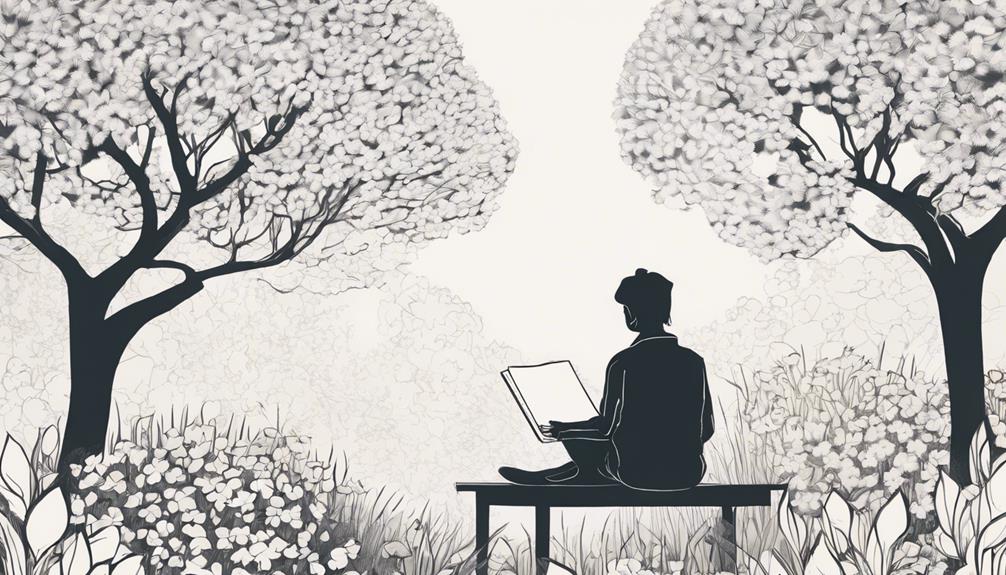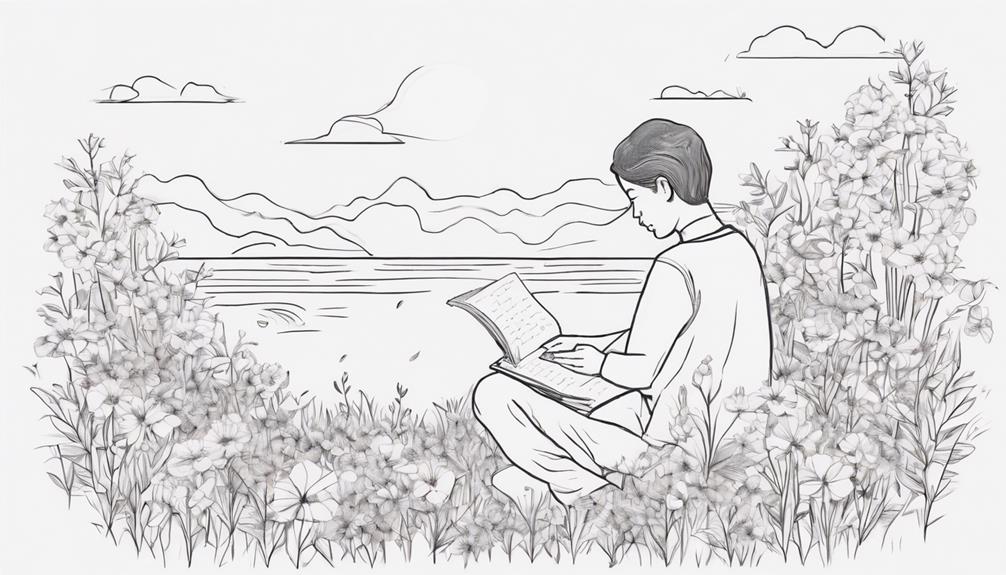The practice of crafting and consuming poetry has long intrigued scholars and enthusiasts alike, prompting a deeper exploration into the underlying motivations. From an analytical perspective, the allure of poetry can be attributed to its unique ability to encapsulate intricate human emotions and experiences within the confines of structured language. As individuals grapple with the complexities of existence, poetry serves as a vessel for distilling these multifaceted truths into poignant verses that resonate across time and space. This interplay between personal introspection and universal truths offers a glimpse into the profound interconnectedness of human existence, inviting further contemplation into the enduring relevance of poetry in our lives.
Key Takeaways
- Poetry enables emotional expression and introspection.
- It captures life's complexities and nuances concisely.
- Poetry fosters connections and empathy through shared experiences.
- It preserves personal and cultural reflections through artistry in language.
Poetry as Emotional Expression

Poetry serves as a profound medium through which individuals can eloquently articulate and navigate their deepest emotions, providing a creative outlet for exploring intricate feelings that may be challenging to convey through conventional language. Emotional expression through poetry allows individuals to delve into the depths of their innermost sentiments, offering a platform for introspection and self-discovery. By engaging with poetry, individuals can not only identify and process their emotions but also gain a deeper understanding of themselves and the world around them.
Furthermore, the act of writing and reading poetry fosters empathy by creating a shared emotional experience between the poet and the audience. Through the evocative language and imagery found in poems, readers can connect with the emotions expressed by the poet, leading to a heightened sense of empathy and understanding. This emotional resonance transcends individual experiences, forming a bridge that allows for the exchange of feelings and perspectives, ultimately fostering a sense of interconnectedness among individuals.
Capturing Life's Complexity Through Verse
Through the intricate weaving of concise and powerful verse, individuals are able to encapsulate the multifaceted complexity of life's experiences and emotions. Poetry serves as a medium through which the depth and richness of human existence can be distilled into artful expressions. Here are three ways in which poetry enables the capturing of life's complexity:
- Exploration of Nuanced Feelings: Poetry allows for the exploration of intricate emotions and thoughts that may be challenging to articulate through other means. By delving into the subtleties of human experience, poets can offer profound insights into the complexities of our inner worlds.
- Reflection of the Human Condition: Through poetry, individuals can reflect on moments of joy, sorrow, love, and loss, providing a nuanced portrayal of the shared human experience. This reflection offers a deeper understanding of the diverse facets of life and the universal themes that bind us together.
- Conveying Depth in Condensed Form: The art of poetry enables writers to convey profound depth and meaning in a condensed and impactful form. By carefully selecting words and crafting poetic imagery, poets can capture the essence of complex experiences, inviting readers to contemplate life's intricacies through verse.
Poetry: A Medium for Self-Reflection

Poetry serves as a platform for individuals to engage in introspection and self-awareness by encapsulating their thoughts and emotions in a concise and expressive manner. This medium allows for a structured reflection on personal experiences, facilitating a deeper understanding of one's own psyche. Through the contemplation of verses, individuals can navigate their inner worlds and gain valuable insights into their identities.
Poetry for Introspection
When engaging with poetic works, individuals are presented with a unique medium for deep self-reflection and introspection.
Poetry for Introspection:
- Reading poetry: By immersing themselves in poetic verses, individuals can unravel complex emotions and thoughts, gaining insights into their inner selves.
- Writing poetry: The act of crafting poetry allows individuals to articulate their deepest feelings and experiences, providing a creative outlet for introspection and self-expression.
- Introspection: Through poetry, individuals embark on journeys of introspection, exploring their subconscious and fostering a greater understanding of themselves, leading to personal growth and self-awareness.
Verse and Self-Awareness
Self-awareness is enhanced through the exploration of verse, offering individuals a creative pathway for deep self-reflection and introspection. Writing poetry makes it possible for individuals to delve into their inner thoughts, emotions, and experiences, thereby improving their ability to understand themselves on a profound level. Poetry helps individuals gain insight into their own psyche by providing a platform to express and process complex feelings that may be challenging to articulate otherwise. Through the act of writing and reading poetry, individuals can confront and navigate their subconscious thoughts and desires, leading to emotional growth and self-discovery. Engaging with verse fosters self-awareness by encouraging introspection and contemplation of personal beliefs and values, ultimately contributing to a deeper understanding of the self.
The Power of Poetry in Communication
Poetry's power in communication lies in its ability to forge emotional connections through the nuanced expression of complex feelings. By encapsulating intricate emotions in poetic form, individuals can communicate their innermost thoughts with depth and clarity. Through the shared experience of poetry, readers and writers alike can evoke empathy and understanding, fostering meaningful connections.
Emotional Connection Through Poetry
Poetry serves as a profound vehicle for fostering emotional connection and communication between individuals through the artful expression of deep feelings and experiences. Poets leverage language and imagery to evoke emotions, creating a shared understanding that resonates with readers. Through poetry, individuals can:
- Explore Complex Emotions: Poems provide a safe space for readers to delve into intricate feelings, offering solace and insight into their own emotional landscapes.
- Enhance Empathy: By engaging with the emotions portrayed in poems, individuals can develop a deeper sense of empathy towards others, fostering connections and understanding.
- Create Shared Experiences: The emotional impact of poetry transcends individual boundaries, uniting people through a collective appreciation of the beauty and depth of language.
Expressing Complex Feelings
The intricate tapestry of human emotions finds a profound avenue for expression and understanding through the intricate artistry of poetic communication. Poetry excels in expressing complex feelings that are often challenging to articulate using everyday language. By employing metaphor and imagery, poets can convey layers of meaning that resonate deeply with readers, helping us delve into the depths of our emotions and experiences. Through the use of these literary devices, poetry can serve as a mirror reflecting our innermost thoughts and feelings, fostering introspection and empathy. The table below highlights the significance of expressing complex feelings through poetry:
| Poetry and Complex Feelings | |
|---|---|
| Facilitates Expression | Allows for articulation of intricate emotions beyond conventional words |
| Enhances Understanding | Aids in comprehending and processing complex feelings |
| Creates Emotional Depth | Utilizes metaphor and imagery to convey profound layers of emotion |
Evoking Shared Experiences
Indisputably, the art of poetic expression holds a profound capacity to evoke shared human experiences through its intricate linguistic craftsmanship. Poetry serves as a medium for connecting individuals on a deep emotional level, transcending barriers of language and culture. Through carefully chosen words and evocative imagery, poets can communicate complex emotions and universal truths that resonate with readers from various backgrounds. This shared emotional experience creates a sense of connection and understanding among individuals, fostering empathy and unity. In essence, poetry acts as a bridge that allows people to relate to one another through the language of emotions, establishing meaningful connections that remind us of our shared humanity.
Poetry: Unlocking Creativity and Imagination
An exploration of poetry's role in unlocking creativity and imagination reveals its profound impact on individuals' cognitive processes and emotional expression. Writing poetry serves as a creative endeavor that allows individuals to delve into their innermost thoughts and feelings, enabling them to articulate their experiences in a unique and expressive manner. By experimenting with language, structure, and form, writers can push the boundaries of traditional storytelling, fostering innovation and originality in their work. Similarly, reading poetry stimulates the imagination by presenting vivid imagery, evocative language, and nuanced emotions that spark creativity in the reader's mind. Engaging with abstract concepts, complex themes, and symbolism in poetry challenges readers to think critically and interpret meaning beyond the literal words on the page. The rhythmic and lyrical nature of poetry captivates readers, drawing them into the beauty of language, rhythm, and sound, thereby enhancing their appreciation for the art form and igniting their own creative potential.
Poetry's Role in Preserving Culture

Poetry serves as a crucial medium for the preservation and transmission of cultural heritage, encapsulating historical events, traditions, and societal values for future generations to access and understand. Through the written word, poems act as a cultural archive, safeguarding the essence of diverse societies. They play a pivotal role in perpetuating oral traditions, ensuring that languages and narratives are passed down through generations. Poetry captures the vibrancy of different cultures, offering a window into the past and present realities of various communities.
Key Points:
- Preservation of Historical Events: Poems immortalize significant events, serving as a written record of the past for future reference.
- Transmission of Oral Traditions: Through poetry, oral histories and cultural practices are preserved and shared across time, maintaining the richness of diverse heritages.
- Reflection of Societal Evolution: Poems reflect the changing norms and beliefs within societies, providing insight into the cultural metamorphosis over centuries.
Poetry's Influence on Language Development
Enhancing vocabulary development and linguistic skills, poetry plays a significant role in shaping language proficiency through the exploration of rich and diverse language choices. Poetic forms, figurative language, and vocabulary development are intricately linked in the realm of poetry. By delving into different poetic forms such as sonnets, haikus, or limericks, individuals are exposed to varying structures and styles, expanding their linguistic repertoire. Figurative language, including metaphors, similes, and personification, challenges readers to interpret beyond the literal meaning, thereby enriching their understanding and usage of language. Furthermore, the nuanced use of literary devices in poetry aids in strengthening verbal reasoning and comprehension of figurative language.
| Poetic Forms | Figurative Language | Vocabulary Development |
|---|---|---|
| Sonnets | Metaphors | Lexicon Expansion |
| Haikus | Similes | Language Proficiency |
| Limericks | Personification | Comprehension Deepening |
Poetry: A Source of Inspiration and Motivation

Serving as a catalyst for emotional introspection and intellectual stimulation, poetry provides a profound wellspring of inspiration and motivation. Through the act of reading and writing poetry, individuals can find encouragement, solace, and strength. Poetry allows for a deep exploration of the human experience, offering a lens through which to view the world around us. Here are three ways in which poetry serves as a source of inspiration and motivation:
- Emotional Connection: Poetry has the ability to evoke strong emotions and connect individuals through shared feelings and experiences. By resonating with the emotions expressed in poems, readers can find motivation and inspiration in knowing they are not alone in their feelings.
- Personal Reflection: Engaging with poetry provides a creative outlet for self-reflection, allowing individuals to explore their thoughts, ideas, and experiences in a unique and expressive way. This process of introspection can spark inspiration and motivate personal growth.
- Universal Themes: Poems often address universal themes such as love, loss, nature, and identity, offering readers a sense of connection to something larger than themselves. By exploring these themes, individuals can find inspiration and motivation to navigate life's challenges with resilience and purpose.
Understanding Human Experience Through Poetry
Poetry serves as a conduit for exploring the intricacies of human emotions, portraying life's multifaceted dimensions through the artful arrangement of words. By depicting universal truths and shared experiences, poetry offers insight into the human condition, transcending individual perspectives to create a collective understanding. Through the lens of poetry, readers and writers can navigate the complexities of existence, finding resonance in the emotional landscapes depicted within the verses.
Emotions in Verse
Exploring the intricacies of human emotions through the medium of verse offers a profound insight into the depths of our shared human experience. Poetry, with its blend of literal and figurative language, allows for a nuanced exploration of emotions. Through free verse and structured forms alike, poets convey raw feelings that resonate with readers on a deep level. In the realm of emotions in verse, three key aspects stand out:
- Expressiveness: Poets use words to paint vivid emotional landscapes, inviting readers to step into the poet's world and experience their feelings.
- Empathy: By delving into the emotional depths of poems, individuals can develop a greater understanding and empathy towards others' experiences and emotions.
- Connection: The emotional resonance of poetry fosters connections between individuals, creating a sense of shared humanity and emotional kinship.
Life's Complexities Depicted
The intricate tapestry of human experiences is skillfully woven into the fabric of poetry, allowing for a profound exploration of life's complexities and the shared nuances of our existence. Poetry is often regarded as a mirror reflecting the myriad emotions, challenges, and joys that unite us as individuals. Years ago, poets began the tradition of delving into the depths of human experience through verse, offering insight and solace to readers navigating their own paths. Through the artful use of language and imagery, poetry captures the essence of relationships, identity struggles, loss, and personal growth, resonating with readers on a profound level. By immersing ourselves in poetry, we engage with the complexities of life, finding connection and understanding in the beauty of poetic expression.
Universal Truths Revealed
Delving into the depths of human emotion and experience, poetry serves as a profound vehicle for illuminating universal truths shared across cultures and generations.
Key Aspects of Universal Truths Revealed through Poetry:
- Timeless Wisdom: Poets encapsulate age-old wisdom in their verses, offering insights that withstand the test of time and resonate with readers through centuries.
- Shared Experiences: Through poetry, individuals find solace in realizing that their joys, sorrows, and struggles are not unique but part of the human tapestry, fostering a sense of connection and understanding.
- Emotional Resonance: Poetic expressions evoke deep emotions within readers, creating a bridge between the poet's sentiments and the reader's own experiences, leading to a profound emotional connection.
Poetry: Fostering Empathy and Connection
Engagement with poetry serves as a catalyst for fostering empathy and establishing connections between individuals. Poetry allows readers to immerse themselves in the emotions and experiences of others, leading to empathy cultivation and connection building. Through the emotional sharing that poetry enables, individuals can relate to diverse perspectives, ultimately fostering a sense of unity and understanding.
To further illustrate the impact of poetry on empathy and connection, consider the following table:
| Poetry Benefits | Description |
|---|---|
| Empathy Cultivation | Poetry enables individuals to understand and share the feelings of others, fostering empathy. |
| Connection Building | Engaging with poetry helps create a bond between individuals through shared emotional experiences. |
| Emotional Sharing | Through poetry, people express and connect with various emotions, promoting understanding. |
In essence, poetry serves as a powerful medium for promoting empathy, unity, and emotional connection among individuals, making it a valuable tool for enhancing human relationships.
The Transformative Nature of Poetry

Poetry serves as a medium for emotional catharsis, enabling individuals to process and express complex feelings in a transformative manner. Through engaging with poems, people embark on a journey of personal growth, self-discovery, and introspection, leading to profound insights and new perspectives. The transformative power of poetry lies in its unique ability to foster connections, evoke empathy, and transcend the boundaries of everyday experiences, offering individuals a cathartic and enriching form of expression.
Emotional Catharsis Through Poetry
The transformative potential of poetry lies in its ability to serve as a conduit for emotional catharsis, allowing individuals to navigate and transmute their innermost feelings into artistic expression. Through the therapeutic outlet that poetry provides, individuals can find solace and release in the following ways:
- Emotional Release: Poetry offers a safe space for individuals to release pent-up emotions and express feelings that may be challenging to articulate verbally.
- Therapeutic Outlet: Writing and reading poetry can act as a form of therapy, helping individuals process and cope with difficult emotions and experiences.
- Artistic Expression: Poetry enables individuals to transform their raw emotions into creative works, fostering a sense of accomplishment and empowerment through artistic expression.
Personal Growth With Poems
Exploring and engaging with poems can catalyze profound personal growth and self-discovery for individuals seeking to delve into the transformative nature of artistic expression. Personal growth through poetry is a journey marked by poetic exploration into one's inner depths, leading to self-discovery and poetic revelations. By allowing individuals to express their emotions and reflect on their experiences, poetry becomes a powerful tool for fostering introspection, cognitive development, and psychological growth. Through poems, individuals find a creative outlet for processing life events, which in turn enhances resilience and adaptability. The transformative nature of poetry lies in its ability to inspire self-reflection, promote healing, and spark personal insights, ultimately contributing to overall well-being and growth.
Connection in Poetic Expression
In the realm of artistic expression, poetic language serves as a conduit for individuals to forge profound connections with others by delving into the depths of complex emotions and shared experiences. Through poetry, people establish poetic bonds, creating a sense of unity and understanding that transcends mere words. This emotional resonance allows individuals to connect on a deeper level, fostering empathy and compassion. Connection through verse enables a unique form of communication that resonates with the human experience, bridging gaps between diverse perspectives and fostering a sense of community. Poetry's transformative nature lies in its ability to cultivate these connections, offering a space for introspection, growth, and shared understanding through the power of language.
Poetry's Impact on Mental Well-being

Poetry's influence on mental well-being is a subject of increasing interest due to its recognized therapeutic benefits. Healing words, emotional release, and mindful contemplation are key aspects of how poetry can positively impact mental health. Through the use of carefully crafted language, poetry has been utilized as a tool for emotional expression and introspection, allowing individuals to navigate complex feelings and experiences. Research indicates that engaging with poetry can lead to a deeper understanding of oneself and significantly reduce symptoms of anxiety and depression.
Moreover, poetry has the ability to foster a sense of connection and empathy, facilitating emotional healing and self-reflection. The cathartic nature of poetry enables individuals to explore and release suppressed emotions, thereby contributing to overall mental wellness. By providing a creative outlet for processing emotions and thoughts, poetry serves as a valuable therapeutic medium that promotes well-being and enhances psychological resilience.
Poetry as a Tool for Social Commentary
Poetry serves as a dynamic medium through which individuals articulate and critique societal issues, advocating for change and amplifying marginalized voices. Poets often engage in poetic activism, using their craft to shed light on societal critique. Through their work, they offer a form of poetic resistance against injustices, amplifying the voices of marginalized communities. This form of poetic rebellion allows for a powerful platform where political advocacy can be expressed subtly yet impactfully. The beauty of poetry lies in its ability to address complex social issues through artistic expression, inviting readers to reflect on the world around them. By delving into the realm of poetry, individuals can engage in meaningful conversations about important social issues, fostering a deeper understanding and empathy towards diverse perspectives. Poetry not only captures the essence of societal challenges but also inspires action and change for a more equitable future.
Celebrating the Beauty of Language Through Poetry

The intricate tapestry of language woven through the art of poetry magnifies the subtleties and nuances of words, inviting readers into a realm where emotions and imagery converge with linguistic finesse. Poetry celebrates linguistic elegance by skillfully manipulating words to create a symphony of sounds and meanings. Poets use poetic language to paint vivid pictures, evoke deep emotions, and explore the beauty of expression. The beauty of language in poetry lies in its ability to transcend ordinary communication and elevate words to a higher form of art. Through carefully chosen words and unique structures, poets showcase the versatility and power of language to capture the complexities of human experience.
| Linguistic Elegance | Poetic Language | Language's Beauty |
|---|---|---|
| Highlights word nuances | Creates vivid imagery | Transcends ordinary communication |
| Magnifies subtleties | Evokes powerful emotions | Elevates words to art |
| Showcases linguistic finesse | Explores beauty of expression | Captures human experience |
Frequently Asked Questions
Why Do We Write and Read Poetry?
We write and read poetry to engage in a profound form of emotional expression, fostering creativity and enabling introspective self-reflection. This literary art form serves as a vehicle for exploring complex emotions and experiences through condensed and impactful language. Through poetry, individuals can delve into the depths of their inner worlds, cultivating a deeper understanding of themselves and others. The act of writing and reading poetry intertwines creativity, emotional expression, and self-exploration.
Why Do Most People Like to Read Poetry?
Most people enjoy reading poetry for the emotional connection it provides, the aesthetic appreciation of its lyrical language, and the potential for personal growth through introspection. Poetry's ability to evoke feelings, stimulate imagination, and offer profound insights into the human experience resonates with readers seeking depth and beauty in their literary pursuits. The brevity and depth of poetic expression allow individuals to explore complex emotions and ideas in a concise and impactful manner, fostering a sense of connection and enlightenment.
What Is the Purpose of Writing Poetry?
The purpose of writing poetry lies in its capacity to serve as a vehicle for emotional expression, a creative outlet for the intricacies of human experience, and a tool for self-reflection. Through the artful manipulation of language and form, poets encapsulate moments of beauty, pain, and contemplation in a condensed and impactful manner. Poetry thus enables individuals to delve into the depths of their emotions, offering a platform for introspection and connection with others.
Why Is Reading Important in Poetry?
Reading poetry is crucial for fostering understanding of the human experience. The importance lies in the profound connection it creates between the reader and the emotions expressed in the verses. This connection leads to enhanced emotional intelligence and empathy. By delving into the intricate layers of poetic language, readers develop a deeper appreciation for artistic expression. Ultimately, reading poetry serves as a gateway to introspection and personal growth.
Conclusion
In the intricate tapestry of human experience, poetry serves as a mirror reflecting the depths of emotion, the complexities of life, and the power of communication. Through its creative language and imagery, poetry unlocks a realm of self-reflection, empathy, and connection with others. It is a tool for personal growth, mental well-being, and societal commentary. Ultimately, poetry celebrates the beauty of language, inviting readers to explore diverse perspectives and emotions in a transformative journey of understanding and growth.
